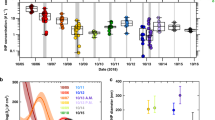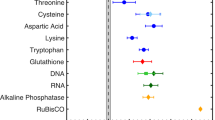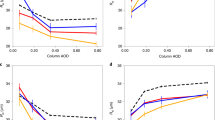Abstract
THE sources and the composition of atmospheric ice nuclei (particles initiating the phase transition to ice at temperatures between 0° C and −40° C) are still largely unidentified, chiefly because they make up an extremely small fraction (perhaps 1 in 106) of the total atmospheric aerosol and because they are a heterogeneous mixture of substances whose only common property is the ability to nucleate ice.
This is a preview of subscription content, access via your institution
Access options
Subscribe to this journal
Receive 51 print issues and online access
$199.00 per year
only $3.90 per issue
Buy this article
- Purchase on Springer Link
- Instant access to full article PDF
Prices may be subject to local taxes which are calculated during checkout
Similar content being viewed by others
References
Bigg, E. K., Science Progress, 49, 458 (1961).
Dufour, L., Ciel et Terre, 82, 1 (1966).
Mossop, S. C., Zeitschr. Angew. Math. Physik, 14, 456 (1963).
Vali, G., Stormy Weather Gr. Sci. Rep., (McGill University, 1968).
Vali, G., J. Atmos. Sci., 28, 402 (1971).
Peach, M., Dean, L. A., and Reed, J., USDA Circ. 757, (1947).
Author information
Authors and Affiliations
Rights and permissions
About this article
Cite this article
SCHNELL, R., VALI, G. Atmospheric Ice Nuclei from Decomposing Vegetation. Nature 236, 163–165 (1972). https://doi.org/10.1038/236163a0
Received:
Issue Date:
DOI: https://doi.org/10.1038/236163a0
This article is cited by
-
Wildland fire as an atmospheric source of viable microbial aerosols and biological ice nucleating particles
The ISME Journal (2021)
-
Glacially sourced dust as a potentially significant source of ice nucleating particles
Nature Geoscience (2019)
-
Forests, atmospheric water and an uncertain future: the new biology of the global water cycle
Forest Ecosystems (2018)
-
Contributions of biogenic material to the atmospheric ice-nucleating particle population in North Western Europe
Scientific Reports (2018)
-
The viscosity of atmospherically relevant organic particles
Nature Communications (2018)
Comments
By submitting a comment you agree to abide by our Terms and Community Guidelines. If you find something abusive or that does not comply with our terms or guidelines please flag it as inappropriate.



